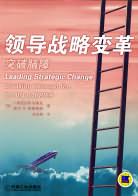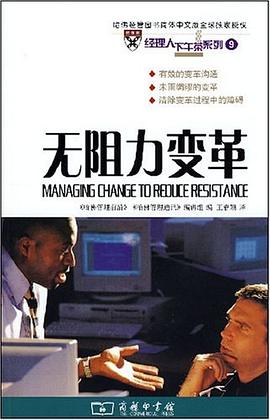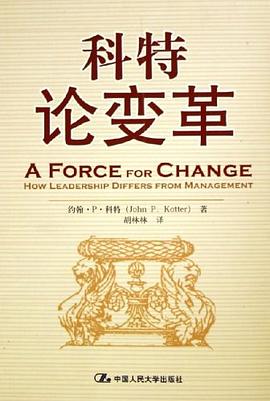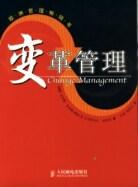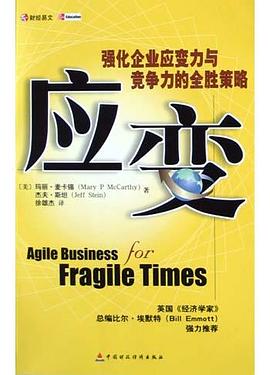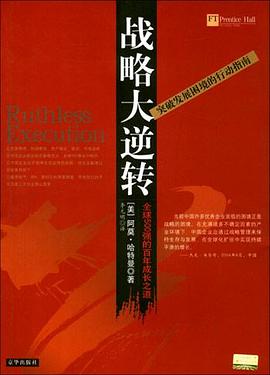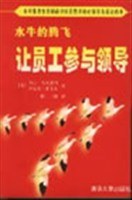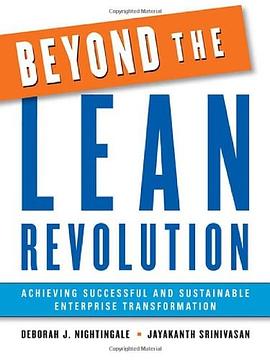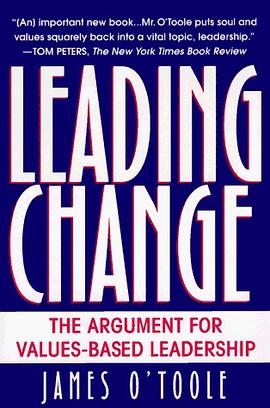

在綫閱讀本書
Book Description
"[An] important new book . . .Mr. O'Toole puts soul and values squarely back into a vital topic, leadership."
--Tom Peters The New York Times Book Review
"A deeply philosophical and eminently practical study of leadership as change."
--James MacGregor Burns Pulitzer Prize and National Book Award winner, and author of Leadership
Current management philosophy advocates an outmoded Machiavellian approach to running organizations: Leaders are told in countless books that they can only accomplish their goals by being tough, manipulative, dictatorial, or paternalistic as the situation requires.
In Leading Change, noted management theorist James O'Toole proposes a provocative new vision of leadership in the business world--a vision of leadership rooted in moral values and a consistent display of respect for all followers. As O'Toole brilliantly demonstrates, values-based leadership is not only fair and just, it is also highly effective in today's complex organizations.
When leaders truly believe that their prime goal is the welfare of their followers, they get results. The finest leaders--from political giants like Washington, Jefferson, and Lincoln to contemporary CEOs like Max De Pree and James Houghton--have always shared leadership with their followers. They create organizations that encourage change and self-reevaluation; they foster an atmosphere of open-mindedness and fresh thinking, in which assumptions can be challenged and goals reassessed.
Grounded in the ideas of moral philosophy, Leading Change powerfully transcends the standard how-to management primer to define a challenging new approach to leadership. As O'Toole so persuasively argues, growth and change are possible, indeed necessary, and they will be effected by individuals who have the stature and the courage to lead morally. This important book, at once thought-provoking and totally practical, is bound to take its place as one of the landmark business volumes of our times.
"Jim O'Toole has written the essential work for organizations to survive and thrive in today's changing world. His intellectually penetrating thinking shows us how the sometimes conflicting problems we wrestle with--often in piecemeal fashion--fit together to form a complete picture, even as the picture itself continues to change. His message is so critical to the very existence of every organization that any leader who fails to heed his advice condemns his or her company to mediocrity and/or early death. It's that basic."
--Warren Bennis Professor and founding chairman of the Leadership Institute at the University of Southern California Author of An Invented Life and Why Leaders Can't Lead
From Booklist
Held up as exemplary in a decade that's desperately seeking a new order for business, in case history after case history of corporations and their executives, are usually names like Ben Cohen of Ben & Jerry's, Anita Roddick of the Body Shop, and even Jack Welch of GE. But those models just won't work anymore, says professor, consultant, and award-winning author O'Toole. Instead, he uses examples from art, history, philosophy, and, yes, occasionally business to probe the answers to three questions: Why do organizations resist change? How can leaders effect change? What should the leadership philosophy be to most effectively (and morally) induce organizational change? He concludes that a values-based leadership is the only way to pull (not push) change; that change challenges the psychological comfort of the powerful--hence, the basis for resistance; and that imposing new values and new visions will work only if leaders create followers. A thoughtful essay, not a how-to manual, that will most likely spark discomfort among legions of American managers.
Barbara Jacobs
From Library Journal
O'Toole's book is stronger in its parts than in its sum. The author, vice president of the Aspen Institute, offers some practical wisdom about leadership, derived in large part from the lessons to be learned from the lives of the figures carved on Mt. Rushmore; other, more recent "corporate Rushmoreans"; and the writings of such thinkers as management guru Peter Drucker, British industrialist Robert Owen, and English philosopher John Stuart Mill. But these are simply insights scattered throughout the pages for the reader to glean rather than elements of a strong, clear, readily identifiable thesis. Some valuable things are said, but the premises tend to be generalizations about generalizations, often specific in illustration but vague in pattern. Interesting in places but not essential.
A.J. Anderson, GSLIS, Simmons Coll., Boston
About Author
JAMES O'TOOLE is a noted authority on leadership and vice president of The Aspen Institute, where he directs the renowned program as Executive Seminar and the Corporate Leaders Forum. He is co-founder (with Warren Bennis) and most recently served as executive director of the Leadership Institute at the University of Southern California. A Rhodes Scholar, O'Toole has consulted widely to businesses and governments and served as special assistant to Secretary of Health, Education and Welfare Elliot Richardson and as chairman of the Task Force on Work in America. His twelve best-selling books include The Executive's Compass (1993) and Vanguard Management (named one of the best books of 1985 by Business Week), Making America Work (1981), and Work in America (1973). O'Toole's work has been profiled in the Los Angeles Times, Fortune, and The Economist, and he has served on the prestigious Board of Editors of the Encyclopedia Britannica.
Book Dimension :
length: (cm)21.2 width:(cm)14.1
具體描述
讀後感
用戶評價
我讀的是中文版,慚愧慚愧
评分我讀的是中文版,慚愧慚愧
评分我讀的是中文版,慚愧慚愧
评分我讀的是中文版,慚愧慚愧
评分我讀的是中文版,慚愧慚愧
相關圖書
本站所有內容均為互聯網搜索引擎提供的公開搜索信息,本站不存儲任何數據與內容,任何內容與數據均與本站無關,如有需要請聯繫相關搜索引擎包括但不限於百度,google,bing,sogou 等
© 2025 onlinetoolsland.com All Rights Reserved. 本本书屋 版权所有

